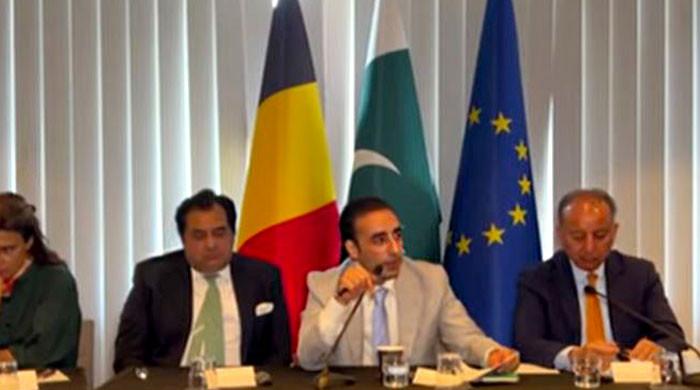Bilawal Bhutto-Zardari Criticizes India Over Indus Waters Treaty
Former Foreign Minister and Pakistan Peoples Party (PPP) Chairman Bilawal Bhutto-Zardari restated his criticism of India’s determination to put the Indus Waters Treaty (IWT) on hold, describing it as an ‘unlawful and independent’ action that imperils regional harmony and constancy.
Pakistan is still willing to find resolutions for all unresolved matters with India through conversation, the former foreign minister stated while speaking to a European think tank located in Brussels.
A distinguished Pakistani Parliamentary group, headed by Bilawal, is currently in Brussels, the capital of the European Union, after fruitful trips to Washington, New York, and London. The purpose of these visits was to counter the Indian narrative spread after the recent conflict between the two nations.
Upon their arrival in Brussels, the delegation received a kind reception from Rahim Hayat Qureshi, Pakistan’s Ambassador to the European Union, Belgium, and Luxembourg, along with officials stationed at the Pakistani Embassy.
The delegation, selected by Prime Minister Shehbaz Sharif, aims to convey Pakistan’s stance on the recent tensions with India and emphasize the significance of addressing the Jammu and Kashmir issue according to the resolutions established by the United Nations Security Council and in line with the desires of the Kashmiri people, as stated in a press release.
The PPP chairman commented that India’s conduct equates to utilizing environmental resources as weapons, which could lead to grave repercussions.
Bilawal cautioned that Pakistan has maintained self-control when faced with Indian provocation; however, any further attempts to impede water flow will force Islamabad to contemplate taking retaliatory steps.
He stated that putting the treaty on hold is the same as upsetting the peace in the region, cautioning New Delhi that if India continues down this path, Pakistan will inevitably respond.
When addressing the recent tensions between Pakistan and India, he mentioned that Islamabad proposed an investigation into the Pahalgam incident; however, New Delhi instead reacted with ‘unwarranted hostility’.
The PPP chairman stated that the Modi government still needs to provide proof regarding the Pahalgam incident.
The former foreign minister emphasized the necessity of stability in the region, highlighting that maintaining peace in South Asia is strongly related to resolving the Kashmir conflict by the resolutions of the United Nations Security Council (UNSC).
He also cautioned that the current Indian government’s policies, particularly those implemented by Prime Minister Narendra Modi, are undermining initiatives for peace in the region.
He further added that Pakistan has given up a countless number of lives while combating terrorism and is still faced with dangers that cross borders, especially after the situation in Afghanistan changed.
Concerning Middle East tensions, the PPP leader denounced Israel’s latest aerial attacks on Iran and urged the international community to take immediate action to lower rising tensions in the Middle East.
He stated that global leaders must move quickly to stop a full-blown war from occurring in the area, and he cautioned that turbulence in South Asia and the Middle East might have global effects.



Comments (0)
No comments yet. Be the first to comment!
Leave a Comment